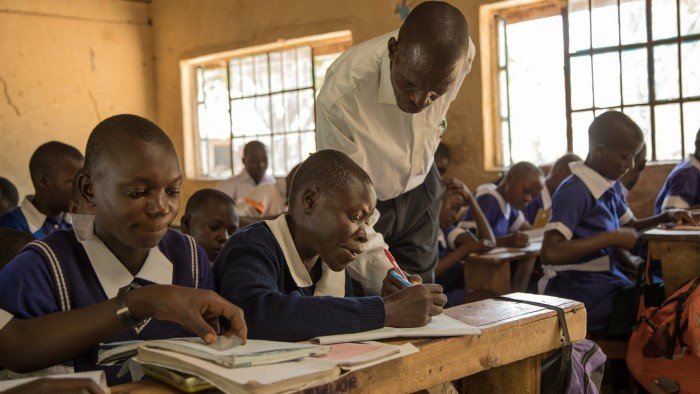Unlock the Editor’s Digest for free
Roula Khalaf, Editor of the FT, selects her favourite stories in this weekly newsletter.
Britain’s development minister will tell MPs that “the days of viewing the UK government as a global charity are over”, as she considers suspending aid to overseas projects supporting education and feminist organisations.
Baroness Jenny Chapman will set out her vision for aid as the government budget is radically reduced over the next two years, when she appears in front of parliament’s international development committee on Tuesday.
The UK’s Foreign Office must pivot from paternalism to partnership and focus more heavily on helping share British expertise abroad rather than directly spending cash, she will say.
The department is examining almost all current aid spending for possible cuts, as part of a Whitehall-wide spending review that will conclude next month.
It is also facing the longer-term reduction in the UK’s aid spending from 0.5 per cent of gross national income to 0.3 per cent from 2027 — a fall of around £6bn annually — under Prime Minister Sir Keir Starmer’s plan to fund a boost in defence investment.
The Foreign Office is considering halting aid funding to an education project in one country, and a gender and inclusion initiative supporting feminist organisations in a particular region, according to people with knowledge of its review.
An end to financial support for a programme supporting devolution in one nation, and a project on access to digital services in another, are also being considered, they said.
“In a world of 0.7 [per cent] we could run these projects, but not in a world of 0.3 [per cent],” said one government official. Expertise could be offered instead of expenditure in some of these cases, the person added.
The department is expected to continue to prioritise aid spending in three specific areas: humanitarian, climate and health initiatives, but significant cuts lie on the horizon even within these categories.
Currently, humanitarian aid channelled to Sudan, Ukraine and Gaza has been ringfenced by Starmer.

Chapman will also tell MPs that there will also be a fresh emphasis on achieving taxpayer value for money in aid funding spent overseas.
“We need to prioritise, be more efficient, and focus on impact above all else,” she will tell the committee, adding: “With less to spend we have no choice. Biggest impact and biggest spend aren’t always the same thing.”
A significant portion of the country’s aid budget is used to house asylum seekers in the UK, putting a further squeeze on the funding available to spend abroad.
Chapman will insist that Britain remains committed to international development and will outline proposals for the government to facilitate institutions — including universities, the City of London, the Met Office, Land Registry and HMRC — offering their expertise overseas, as an alternative to aid expenditure.
A central aim is to help countries “be more resilient and support themselves”, by helping developing nations to grow their own economies, she will add.
Campaigners are likely to highlight the challenges of this approach in the poorest nations, particularly those ravaged by conflict.

The One campaign, an international, non-partisan organisation focusing on improving economic opportunities and better health outcomes in Africa, last week made the first step towards a potential judicial review of the reduction to the aid budget.
It sent a pre-action letter to the Foreign Office, seen by the FT, challenging the legality of UK government aid cuts. It argues that under legislation passed in 2015, the UK is legally bound to allocate 0.7 per cent of GNI to aid.
While the previous Conservative government cut the budget to 0.5 per cent in 2021, citing the exceptional circumstances of the Covid pandemic, the letter argues that the latest aid spending reduction has been presented by the Labour administration as a long-term “strategic realignment of spending priorities”, rather than a “temporary response to an emergency need”.
Government officials hit back that the International Development Act allows for temporary departures from the 0.7 per cent target due to fiscal circumstances, which must be explained in an annual report to parliament. The FCDO will meet all legal requirements under the legislation, they said.
One government insider said the One campaign’s letter was “a disappointing waste of money”, adding: “We plan to work in partnership with the development sector.”

